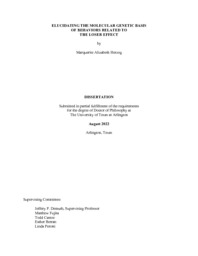
ATTENTION: The works hosted here are being migrated to a new repository that will consolidate resources, improve discoverability, and better show UTA's research impact on the global community. We will update authors as the migration progresses. Please see MavMatrix for more information.
Show simple item record
| dc.contributor.advisor | Demuth, Jeffery P | |
| dc.creator | Herzog, Marquerite Alizabeth | |
| dc.date.accessioned | 2022-09-15T13:09:07Z | |
| dc.date.available | 2022-09-15T13:09:07Z | |
| dc.date.created | 2022-08 | |
| dc.date.issued | 2022-09-01 | |
| dc.date.submitted | August 2022 | |
| dc.identifier.uri | http://hdl.handle.net/10106/30951 | |
| dc.description.abstract | Across the animal kingdom, when individuals experience social defeat (losing an aggressive conflict with a conspecific), it elicits stereotypical loser behavior such as isolation or submissiveness. In many species, social defeat is a precursor to the "loser effect" (LE), the propensity for individuals who lose a contest to lose subsequent competitions. Experiments in rodent systems reveal physiological consequences of social defeat and loser behaviors, but underlying genetic mechanisms of the LE remain elusive. Furthermore, of the recent studies investigating gene expression changes associated with social defeat, there is little focus on the recovery of LE, wherein some animals naturally exit loser behaviors. In the following four chapters, we present research on observed behavior that stems from social defeat to identify changes in gene expression that correlate with the duration, the related protein synthesis activity, and the gene regulation of the LE. We first present a synthetic perspective of LE by discussing both the behavioral and genetic components from onset to recovery and identify current gaps in our understanding. In chapter two, we investigate the effect of a broad-spectrum protein synthesis inhibitor, cycloheximide (CHX), on the maintenance of LE. Using the broad-horned flour beetle (Gnatocerus cornutus) as a model system, we show that CHX treatment eliminates stereotypical LE behaviors and prolongs the time to re-initiate LEs. In chapter three, we present gene expression data that reinforces the current understanding of how vital certain neurotransmitters are in regulating long-term depression. LE shutdown appears to be initiated by shutting down neurotransmitter production, while recovery mediates by elevating the expression of anti-stress pathways associated with increased synapse potential. Finally, in chapter four, we present a behavioral study highlighting the potential for G.cornutus to be a model system for behavior studies by demonstrating how environmental stress can impact the probability of success in aggressive conflict. | |
| dc.format.mimetype | application/pdf | |
| dc.language.iso | en_US | |
| dc.subject | Loser effect | |
| dc.subject | Social defeat | |
| dc.subject | Behavioral genetics | |
| dc.subject | Aggressive behavior | |
| dc.title | ELUCIDATING THE MOLECULAR GENETIC BASIS OF BEHAVIORS RELATED TO THE LOSER EFFECT | |
| dc.type | Thesis | |
| dc.degree.department | Biology | |
| dc.degree.name | Doctor of Philosophy in Quantative Biology | |
| dc.date.updated | 2022-09-15T13:09:07Z | |
| thesis.degree.department | Biology | |
| thesis.degree.grantor | The University of Texas at Arlington | |
| thesis.degree.level | Doctoral | |
| thesis.degree.name | Doctor of Philosophy in Quantitative Biology | |
| dc.type.material | text | |
| dc.creator.orcid | 0000-0001-5992-1590 | |
Files in this item
- Name:
- HERZOG-DISSERTATION-2022.pdf
- Size:
- 2.148Mb
- Format:
- PDF
This item appears in the following Collection(s)
Show simple item record


